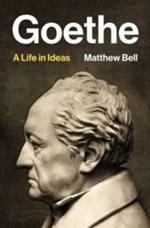Johann Wolfgang von Goethe (1749-1832) was a poet, a novelist, a scientist and an essayist on a dizzying range of topics. In the nineteenth century, he was widely regarded as one of the most important thinkers of modern Europe. In this important and ambitious work, Matthew Bell offers a wide-ranging intellectual biography of Goethe, tracing the evolution of his thought and reassessing its value. Bell examines the full spectrum of Goethe’s writing, from his most well- known works, including the dramatic poem Faust and the novels Wilhelm Meister and The Sorrows of Young Werther, to lesser-known essays and reviews. Throughout, Bell draws on Goethe’s letters and diaries, most of which are still only available in German, embedding Goethe’s thought in his lived experience and in the cultural and intellectual life of Europe from the 1750s to the 1830s. Bell presents new interpretations of Goethe’s work as one of the first evolutionary biologists, describing discoveries that anticipated Darwin’s, and of his political ideas, which pervade his literary work in ways that have not been fully recognised

Goethe: a life in ideas
ISBN: 9780691153957
Format: Hardback
Publisher: Princeton University Press (ADS)
Origin: US
Release Date: January, 2026
157270

